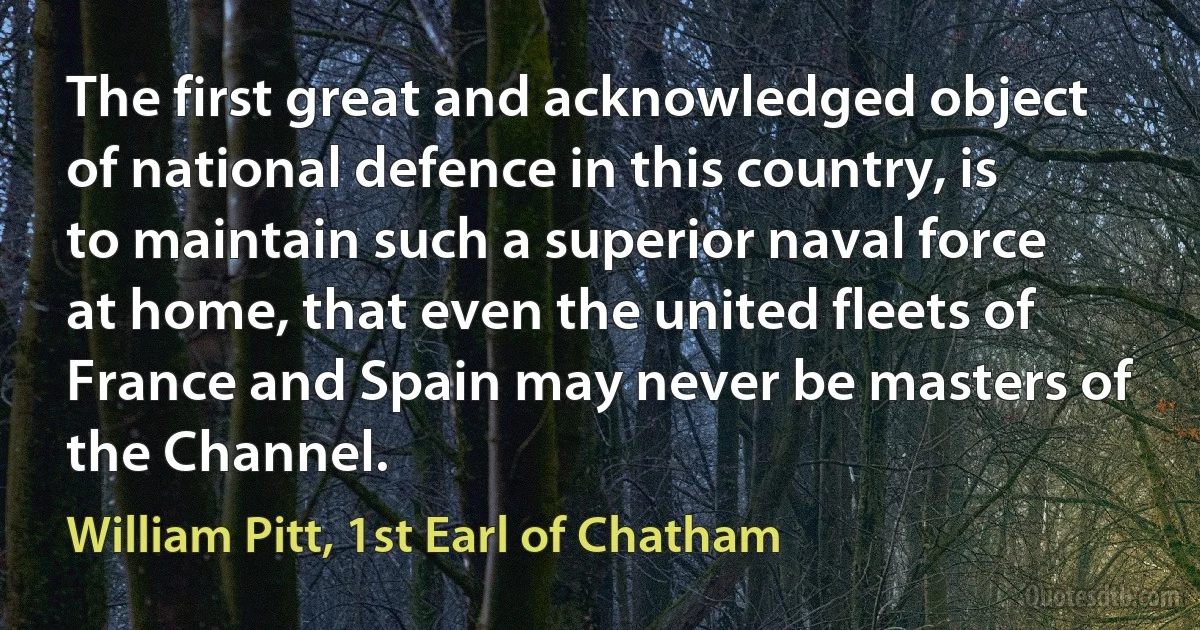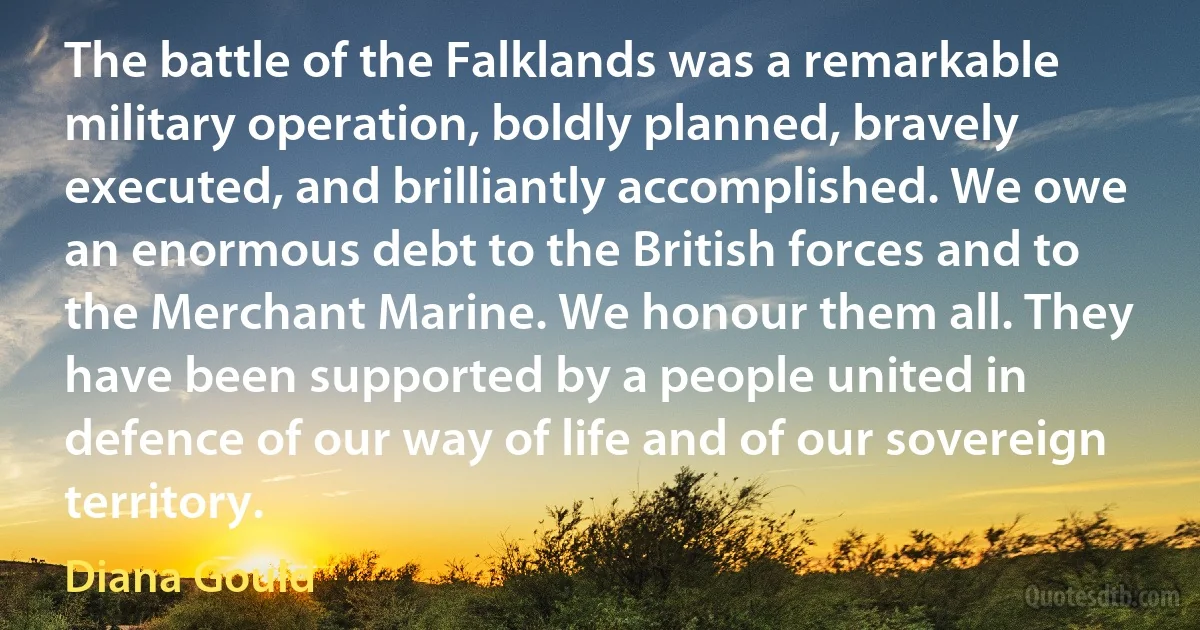Defence Quotes - page 13
[On a defence of the burka preventing men from looking at women sexually.] No, no, no. Honestly, the burka doesn't work. I was in a cab in Piccadilly the other day when a woman in a full burka crossing the road in front of me tripped over the pavement, went head over heels and up it came, red g-string and stockings. I promise that happened. The taxi driver will back me up on that.

Jeremy Clarkson
Government was instituted for the purposes of common defence ... In short, it is the greatest absurdity to suppose it in the power of one, or any number of men ... to renounce their essential natural rights, or the means of preserving those rights; when the grand end of civil government, from the very nature of its institution, is for the support, protection, and defence of those very rights; the principal of which, as is before observed, are Life, Liberty, and Property. If men, through fear, fraud, or mistake, should in terms renounce or give up any essential natural right, the eternal law of reason and the grand end of society would absolutely vacate such renunciation. The right to freedom being the gift of God Almighty, it is not in the power of man to alienate this gift and voluntarily become a slave.

Samuel Adams
If thou wert the lion, the fox would beguile thee; if thou wert the lamb, the fox would eat thee; if thou wert the fox, the lion would suspect thee, when, peradventure, thou wert accused by the ass; if thou wert the ass, thy dulness would torment thee, and still thou livedst but as a breakfast to the wolf; if thou wert the wolf, thy greediness would afflict thee, and oft thou shouldst hazard thy life for thy dinner; wert thou the unicorn, pride and wrath would confound thee, and make thine own self the conquest of thy fury; wert thou a bear, thou wouldst be killed by the horse; wert thou a horse, thou wouldst be seized by the leopard; wert thou a leopard, thou wert german to the lion, and the spots of thy kindred were jurors on thy life; all thy safety were remotion, and thy defence, absence. What beast couldst thou be, that were not subject to a beast? and what beast art thou already, that seest not thy loss in transformation!

Timon of Athens
Joe Hume talked to me very earnestly about the necessity of an union of Liberals. He said much about Ballot and the Franchise. I told him that I could easily come to some compromise with him and his friends on these matters, but that there were other questions about which I feared that there was an irreconcileable difference, particularly the vital question of national defence. He seemed quite confounded, and had absolutely nothing to say. I am fully determined to make them eat their words on that point, or to have no political connection with them.

Thomas Babington Macaulay
In this country at all times, but especially at the present conjuncture, when the whole Energy of the State is required to unite reasonable men in defence of our existing Institutions, and to put down the spirit of Treason and Disaffection which in certain of the Manufacturing Districts in particular, pervades the lower orders, it is of the greatest moment, that the public sentiment should not be distracted or divided, by any unnecessary interference of the Government in events, passing abroad, over which they can have none, or at best but very imperfect means of controul.

Robert Stewart, Viscount Castlereagh
A year ago we had undertaken no specific commitments on the Continent of Europe, beyond those which had then existed. ... To-day we are bound by new agreements for mutual defence with Poland and Turkey; we have guaranteed assistance to Greece and Rumania against aggression. ... We know that, if the security and independence of other countries are to disappear, our own security and our own independence will be gravely threatened. We know that if international law and order is to be preserved, we must be prepared to fight in its defence.

Edward Wood
Spinoza's views on God, religion and society have lost none of their relevance. At a time when Americans seem willing to bargain away their freedoms for security, when politicians talk of banning people of a certain faith from our shores, and when religious zealotry exercises greater influence on matters of law and public policy, Spinoza's philosophy – especially his defence of democracy, liberty, secularity and toleration – has never been more timely. In his distress over the deteriorating political situation in the Dutch Republic, and despite the personal danger he faced, Spinoza did not hesitate to boldly defend the radical Enlightenment values that he, along with many of his compatriots, held dear. In Spinoza we can find inspiration for resistance to oppressive authority and a role model for intellectual opposition to those who, through the encouragement of irrational beliefs and the maintenance of ignorance, try to get citizens to act contrary to their own best interests.

Baruch Spinoza
The garrison laid down their arms before Satan. Michael placed his flaming sword at the feet of the conquering archangel.
"Take back your sword, Michael," said Satan. "It is Lucifer who yields it to you. Bear it in defence of peace and law." Then letting his gaze fall on the leaders of the celestial cohorts, he cried in a ringing voice:
"Archangel Michael, and you, Powers, Thrones, and Dominations, swear all of you to be faithful to your God."
"We swear it," they replied with one voice.
And Satan said:
"Powers, Thrones, and Dominations, of all past wars, I wish but to remember the invincible courage that you displayed and the loyalty which you rendered to authority, for these assure me of the steadfastness of the fealty you have just sworn to me."

Anatole France
I will be ruthless in ridding the army of people who cannot live up to its values. And I need everyone of you to support me in achieving this. The standard you walk past, is the standard you accept. that goes for all of us, but especially those, who by their rank, have a leadership role. NB While on Q & A, ABC TV on 1st February 2016, Australian of the Year, Lieutenant General David Lindsay Morrison attributed; "The standard you walk by is the standard you accept"; to David Hurley, former Chief, Australian Defence Force, explaining the quote; " ... doesn't belong to me or [my former speechwriter] Cate McGregor, it belongs to the Governor of NSW, David Hurley."

David Morrison
You appear to have seen Holcrofts pamphlet; which certainly displays much ability and goodwriting, but most of all the extreme vanity and self-importance of the author, which is equally ridiculous and disgusting. He thinks it impossible that any court or jury in the world could have resisted the force of his combined eloquence and philosophy; and actually told me that hewould gladly have given one of his hands for the opportunity of making his defence, which by the way would certainly have hanged him, however favourable his judges might have been beforehand.

Joseph Ritson
Peace is not bought cheaply. It cannot be won without cost. The cost of Britain's defence is the price we pay to prevent war. The money for our armed services is truly our "peace tax”. What a cruel irony it is that the word "peace” has been hijacked by those who seek one-sided disarmament. It's ironic because if only one side disarms, the other is far more tempted to aggression. Unilateralism makes war more likely. We who believe in strong defence are the true peace party.

Margaret Thatcher
If in this book harsh words are spoken about some of the greatest among the intellectual leaders of mankind, my motive is not, I hope, the wish to belittle them. It springs rather from my conviction that, if our civilization is to survive, we must break with the habit of deference to great men. Great men may make great mistakes; and as the book tries to show, some of the greatest leaders of the past supported the perennial attack on freedom and reason. Their influence, too rarely challenged, continues to mislead those on whose defence civilization depends, and to divide them. The responsibility of this tragic and possibly fatal division becomes ours if we hesitate to be outspoken in our criticism of what admittedly is a part of our intellectual heritage. By reluctance to criticize some of it, we may help to destroy it all.

Karl Popper
The one case in which he referred to the "invisible hand" was that in which private persons preferred the home trade to the foreign trade, and he held that such preference was in the national interest, since it replaced two domestic capitals while the foreign trade replaced only one. The argument of the two capitals was a bad one, since it is the amount of capital that matters, not its subdivision; but the invisible sanction was given to a Protectionist idea, not for defence but for employment. It is not surprising that Smith was often quoted in Parliament in support of Protection. His background, like ours today, was private enterprise; but any dogma of non-intervention by government has to make heavy weather in The Wealth of Nations.

Adam Smith
In view of laws which permit abortion and in view of efforts, which here and there have been successful, to legalize euthanasia, movements and initiatives to raise social awareness in defence of life have sprung up in many parts of the world. When, in accordance with their principles, such movements act resolutely, but without resorting to violence, they promote a wider and more profound consciousness of the value of life, and evoke and bring about a more determined commitment to its defence. [...] This situation, with its lights and shadows, ought to make us all fully aware that we are facing an enormous and dramatic clash between good and evil, death and life, the "culture of death" and the "culture of life". We find ourselves not only "faced with" but necessarily "in the midst of" this conflict: we are all involved and we all share in it, with the inescapable responsibility of choosing to be unconditionally pro-life.

Pope John Paul II


